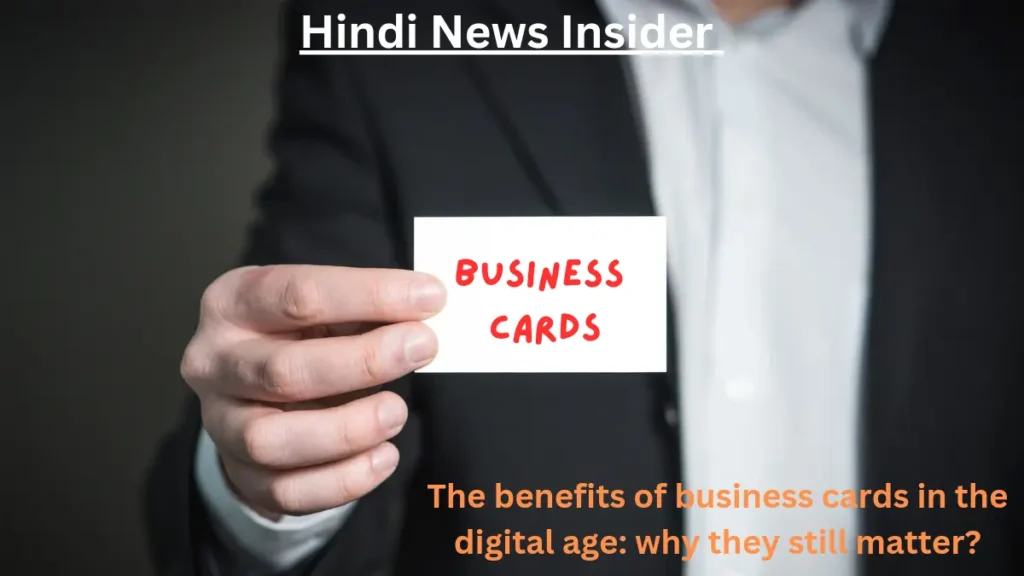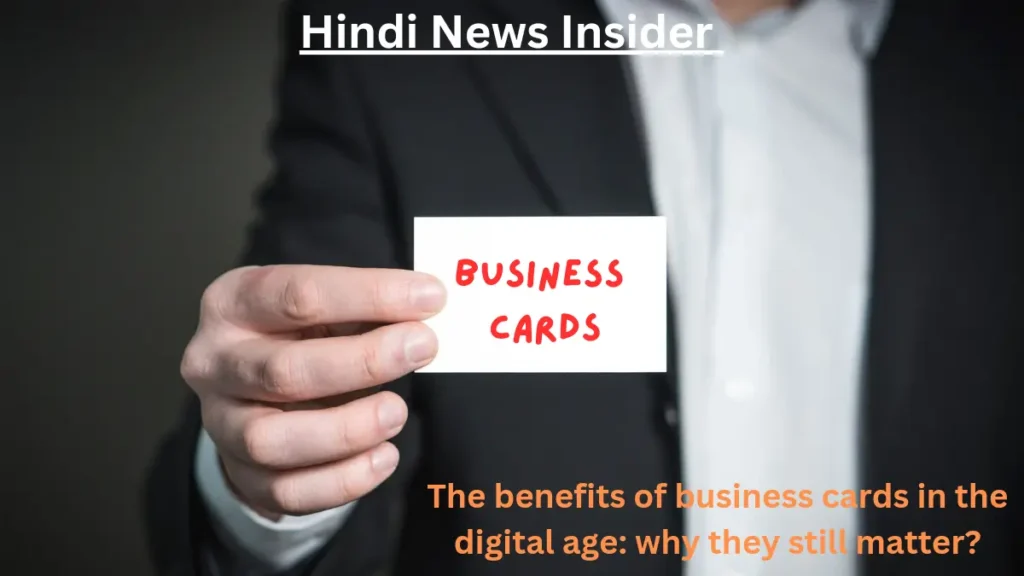In an age dominated by digital communication, social media profiles, and online networking, the humble business card may seem like an outdated relic. However, these small pieces of cardstock still hold significant value and offer unique benefits that digital alternatives can’t fully replicate. Here, we explore the enduring relevance and advantages of business cards in the digital age.
Table of Contents
Tangibility and Personal Touch
One of the most significant benefits of business cards is their physical presence. In a world where so much interaction happens through screens, the act of handing over a business card adds a personal touch to networking. This physical exchange can create a memorable moment, fostering a stronger connection between individuals. A business card, with its tangible quality, provides a sensory experience that digital interactions lack.

Professionalism and Credibility
Presenting a well-designed business card can immediately elevate your professional image. It demonstrates that you take your business and your brand seriously. In face-to-face meetings, especially in formal or high-stakes settings, handing over a business card is often expected and appreciated. It signals that you are prepared, organized, and respectful of traditional business practices.
Convenience and Accessibility
Despite the prevalence of smartphones and digital contact management tools, exchanging contact information digitally can sometimes be cumbersome or prone to errors. Business cards provide a quick and reliable method to share your details. They don’t require an internet connection, battery life, or compatibility with the other person’s device. In scenarios where technology might fail or be impractical, a business card ensures that your contact information is readily accessible.
Branding and First Impressions
Business cards are a powerful branding tool. They offer an opportunity to convey your brand’s identity through design elements such as logos, colors, fonts, and textures. A well-crafted business card can make a lasting impression and differentiate you from competitors. It’s often the first piece of your brand that potential clients or partners encounter, and it sets the tone for how they perceive your business.
Networking Efficiency
In networking events, conferences, and meetings, the ability to quickly exchange contact information is crucial. Business cards facilitate this process, allowing for efficient and effective networking. They enable you to connect with multiple people in a short amount of time without the need for prolonged interactions to exchange digital details. This efficiency is particularly valuable in fast-paced environments where time is limited.
Versatility and Customization
Business cards are versatile marketing tools. They can be customized to suit different purposes and audiences. For instance, you might have different designs for various sectors of your business or different roles within your company. They can also include unique elements such as QR codes that link to your website, portfolio, or social media profiles, bridging the gap between physical and digital worlds.
Memory Aid
People often retain business cards they receive, especially if they are well-designed and professional-looking. These cards can serve as a reminder of the interaction and the individual who provided it. In a stack of cards collected at an event, a distinctive business card can stand out and jog someone’s memory about the conversation they had with you.
Expanding Your Reach
Business cards can reach people beyond the initial recipient. They can be passed on to others, extending your network organically. For example, a satisfied client might hand your card to a colleague looking for similar services. This potential for secondary distribution can lead to unexpected opportunities and connections.
Complementing Digital Presence
Business cards do not have to exist in isolation from your digital presence; they can complement it. Including your social media handles, website, and email on your business card bridges the gap between offline and online interactions. This integrated approach ensures that recipients can easily follow up with you in the digital space, reinforcing and expanding your professional network.
Cultural and Regional Considerations
In many cultures, the exchange of business cards is a deeply ingrained business practice. It is considered a sign of respect and professionalism. In such contexts, not having a business card can be seen as a faux pas. Understanding and respecting these cultural norms is essential for building successful international business relationships.
Adaptability to Trends
The design and functionality of business cards can evolve with trends and technology. For instance, modern business cards often incorporate QR codes, NFC (Near Field Communication) chips, or augmented reality elements. These technological enhancements add value and interactivity to traditional business cards, keeping them relevant and engaging in the digital age.
Environmental Considerations
Concerns about the environmental impact of paper products have led to more sustainable practices in business card production. Many companies now offer eco-friendly options, using recycled materials and soy-based inks. Choosing sustainable business cards can reflect positively on your brand, demonstrating your commitment to environmental responsibility.
Cost-Effectiveness
Compared to many digital marketing tools, business cards are relatively inexpensive. They offer a cost-effective way to market your business and maintain a professional image. For small businesses and startups, business cards can provide significant value without requiring a large investment.

Conclusion
In conclusion, business cards remain a vital tool in the digital age due to their tangibility, personal touch, and ability to convey professionalism and brand identity. They provide a convenient and efficient way to exchange contact information, enhance networking efforts, and create memorable impressions. By integrating traditional business cards with modern technological enhancements and sustainable practices, professionals can continue to leverage their benefits while staying relevant in a rapidly changing digital landscape.
The enduring value of business cards lies in their ability to complement digital interactions, provide a personal touch, and serve as a versatile branding tool. As technology continues to evolve, business cards can adapt, incorporating new features that enhance their functionality and appeal. Despite the rise of digital communication, the business card remains a powerful and effective tool for building and maintaining professional relationships.
